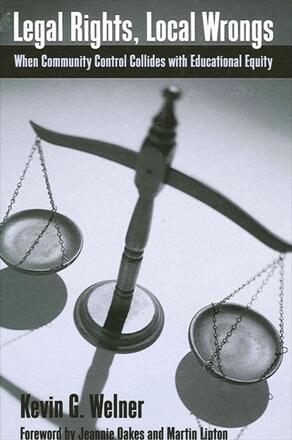
Legal Rights, Local Wrongs
When Community Control Collides with Educational Equity
Alternative formats available from:
Shows how education reforms take place within cauldrons of political interests and conflicting values and beliefs.
Description
Based on an examination of four school districts facing the prospect of court-ordered detracking, Legal Rights, Local Wrongs challenges fundamental assumptions about the opportunities for equity-minded educational reform. Welner studied districts across the country in San Jose, California; Wilmington, Delaware; Woodland Hills, Pennsylvania; and Rockford, Illinois. These case studies show how white upper middle class parents exercised a disproportionate amount of power in local school policy making, and how that power was wielded to hinder reform opportunities intended to benefit low-income students of color. He shows how many school reforms must arise and develop within cauldrons of political interests and conflicting values and beliefs. This reform context is very different from the politically neutral environments presupposed by conventional school change literature. The book's political and normative focus accordingly examines the least often addressed—and yet most daunting—obstacles standing between America and the just, equitable schools portrayed in American rhetoric.
Kevin G. Welner is Assistant Professor of Education at the University of Colorado at Boulder and a former practicing attorney.
Reviews
"By examining the tensions that court-mandated reforms can raise among students, teachers, administrators, and parents, Welner reveals a significant wrinkle in the way educational reform is (or is not) implemented in districts and schools. " — Library Journal
"Welner's unsettling analysis suggests modifications to influential theories and practices that often leave reformers watching helplessly as communities, courts, and schools sabotage well-intentioned, rational, but politically naive schemes for change. Welner argues for combining a nuanced awareness of local practices, a sensitivity to local norms, and the firm hand of the courts. While his recommendations frequently contradict conventional school reform wisdom, Welner grounds his unorthodoxy in powerful, first-hand observations and clear explanations, demonstrating that community resistance will almost always contort bottom-up efforts at reforms like detracking. In the end, however, we must consider even imperfect implementation of equity-minded reforms to be hopeful moments in the struggle for a more socially just society. " — From the Foreword by Jeannie Oakes and Martin Lipton, coauthors of Teaching to Change the World